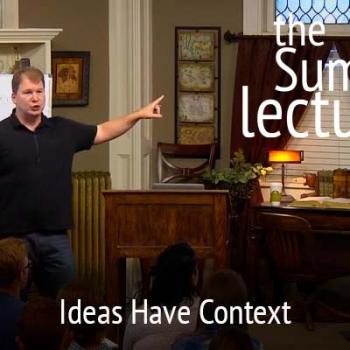
To purchase the entire DVD set of the Summit Lecture Series, visit summit.org.
There are many different ways to look at the question “Can we be moral without God?” One perspective is to wonder if atheists can be good. I believe that, of course atheists can be good. Without a doubt. I have known several atheists who loved their children, were deeply kind to others, and selflessly give of themselves to those in need. So, in that sense, of course atheists can be good.
But, when we wonder if we can be moral without God, what we are really asking is “Can the Moral Law exist without the existence of God?”
In other words, which worldview best makes sense of the universal Moral Law? Is it the worldview that has God as the foundation of being and the Creator of the universe? Or is it the materialist, or naturalist, which holds that all that exists is matter, there is no God, nor souls, etc.
Which worldview makes the most sense of morality?
What I mean is that it seems as though there is a universal Moral Law. So, if there is a Moral Law, must there be a Lawgiver? And if there is a Moral Lawgiver, is that Being God?
Now, imagine that you and a very close friend are sharing a meal together. You are both able to fully appreciate the meal: how good it tastes, all its nuances and pairings. But let’s say that your friend doubted the existence of the cook who prepared your meal.
When your friend says, “I don’t believe that chefs exist”, that doesn’t mean that they are unable to appreciate the meal.
Likewise, when an atheist says that they don’t believe in God as a Moral Lawgiver, they are “sharing in the same meal” as us, but doubting the existence of the chef from which the meal came from.
Yet, the nature of the meal implies the existence of the chef.
Therefore, we have to begin with defining what the Moral Law is in the first place. Moral Relativists doubt if such a thing even exists. Actually most people who claim to be relativists are actually “selective relativists”. That is to say, they hold that there is no Moral Law. However, when their own rights seem to be violated, they appeal to the very law that they deny.
And, when it comes to the “New Atheists”, such as Christopher Hitchens, Richard Dawkins, Daniel Dennett, and Sam Harris, not a single one of them deny that there is a objective Moral Law. In fact, much of their cases against Christianity is dependent on objective morality.
For instance, in their books, they talk about the bad things done throughout history by Christians. Yet, how can a moral relativist – someone who doesn’t believe in a universal and objective Moral Law – make a judgment on the “evil” things done by Christians, if there is no universal and objective moral law?
If they say, “Christians did horrible things 1,000 years ago!” Then, the argument for those very Christians could be, “That was just our culture. It’s how we did things then. Who are you to judge?”
So, at the end of the day, even the new atheists have to believe in some objective Moral Law.












